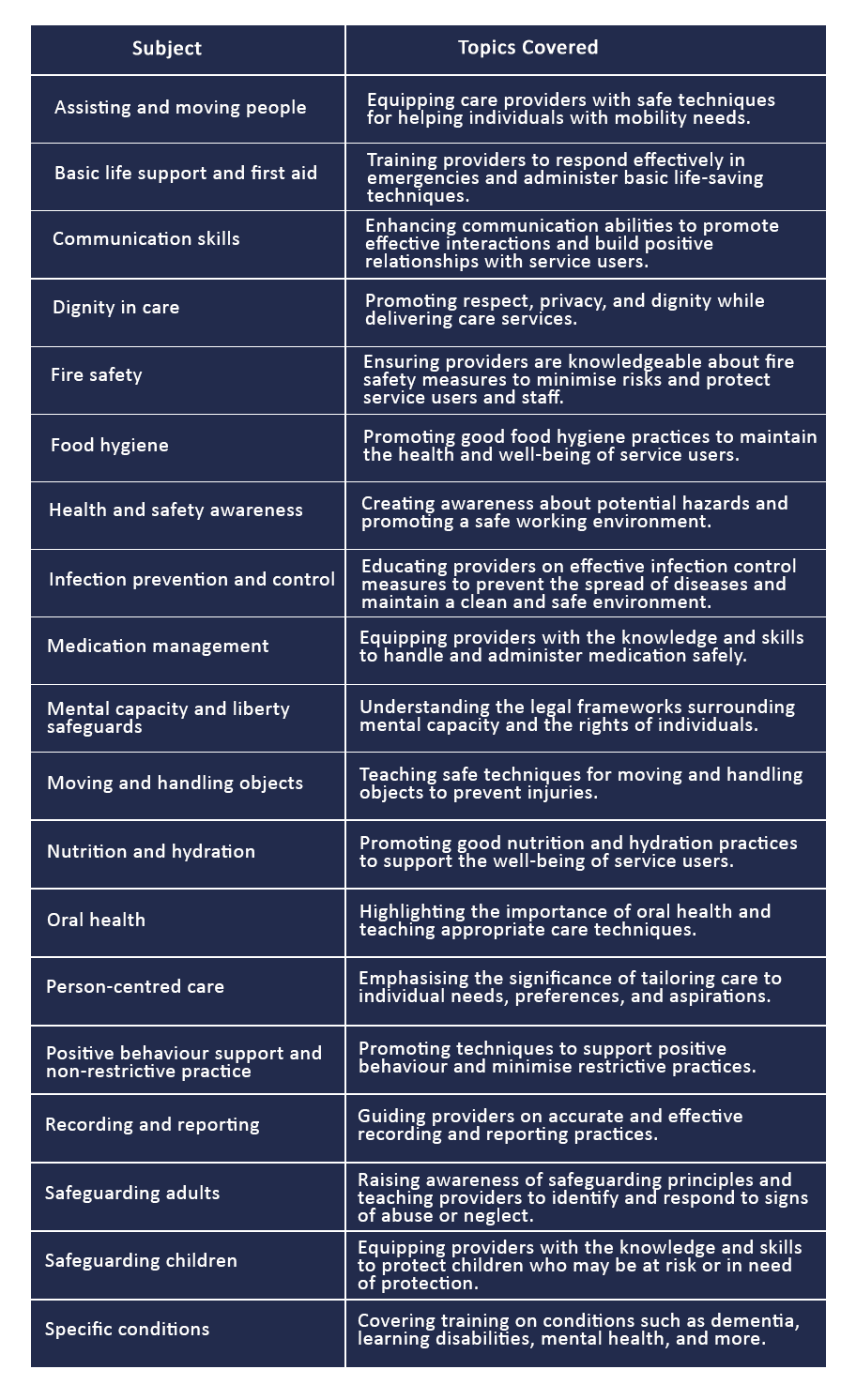You have no items in your shopping basket.
Enhancing adult social care: Skills for care's training framework
Skills for care's core and mandatory training framework: Elevating the standards of adult social care
Rose Mabiza
16-02-2024
In the ever-evolving field of adult social care, maintaining high standards of training and professional development is crucial to ensure the well-being and safety of vulnerable individuals. Recognising this need, Skills for Care, a leading organisation in the social care sector, has developed a comprehensive core and mandatory training framework.
This blog will discuss the framework’s structured approach to training, equipping adult social care providers with skills and knowledge to deliver exceptional care.
Understanding the core and mandatory training framework
Understanding the significance of Skills for Care's core and mandatory training framework is essential to define its purpose and provide an overview of its structure.
Core and mandatory training refer to the foundational knowledge and skills that every adult social care provider should possess. Skills for Care's framework is a guiding tool to ensure consistent training standards across the sector.

Image by seventyfourimages via Envato Elements

Image by microgen via Envato Elements
Key elements of the core and mandatory training framework
Skills for Care's framework covers a wide range of essential subjects, ensuring that adult social care providers comprehensively understand crucial areas. Some of the key topics covered include:

Importance and benefits of the core and mandatory training framework
The core and mandatory training offers several crucial benefits to adult social care providers and the individuals they support. These include:
- Ensuring compliance with regulatory requirements - Meeting regulatory requirements is vital for operating within the social care sector, and this framework helps providers fulfil those obligations.
- Enhancing care quality and safety - By equipping providers with essential knowledge and skills, the framework improves the quality and safety of care delivered to service users.
- Promoting professional development and growth - The framework encourages ongoing professional development, empowering care providers to expand their knowledge and skills for career advancement.
- Fostering confidence and empowerment - Care providers gain confidence in their abilities through comprehensive training, leading to improved outcomes and increased job satisfaction.
- Facilitating consistency and standardisation - The framework promotes consistency in training standards across the sector, ensuring a constant care quality and competency level.

Image by mihacreative via Envato Elements

Image by LightFieldStudios via Envato Elements
Implementing the core and mandatory training framework
To successfully implement the Skills for Care's core and mandatory training framework, adult social care providers should consider the following steps:
- Tailoring training to organisational needs - Assess the specific training requirements of your organisation and customise the framework accordingly.
- Establishing training objectives and plans - Set clear objectives and develop a training plan to cover all essential subjects adequately.
- Engaging staff in continuous learning - Encourage staff to actively participate in training programs and provide opportunities for constant learning and professional growth.
- Utilising technology and e-learning solutions - Leverage technology and e-learning platforms to deliver training efficiently, allowing flexibility and accessibility.
- Evaluating training effectiveness and impact - Regularly evaluate the effectiveness of the training programs and assess their impact on care quality and staff performance.
Conclusion
The Skills for Care's core and mandatory training framework provides a comprehensive roadmap for adult social care providers to enhance their workforce's skills, knowledge, and competencies. By incorporating these key elements, this framework enables organisations to meet regulatory requirements while delivering high-quality care and ensuring the safety and well-being of service users.
With a structured approach to training and continuous professional development, adult social care providers can empower their staff, foster consistency, and create an environment that promotes excellence in care provision. By embracing this framework, organisations can drive positive change and make a significant difference in the lives of those they serve.

Image by fauziEv8 via Envato Elements
In the ever-evolving field of adult social care, maintaining high standards of training and professional development is crucial to ensure the well-being and safety of vulnerable individuals. Recognising this need, Skills for Care, a leading organisation in the social care sector, has developed a comprehensive core and mandatory training framework.
This blog will discuss the framework’s structured approach to training, equipping adult social care providers with skills and knowledge to deliver exceptional care.
Understanding the core and mandatory training framework
Understanding the significance of Skills for Care's core and mandatory training framework is essential to define its purpose and provide an overview of its structure.
Core and mandatory training refer to the foundational knowledge and skills that every adult social care provider should possess. Skills for Care's framework is a guiding tool to ensure consistent training standards across the sector.

Image by seventyfourimages via Envato Elements
Key elements of the core and mandatory training framework
Skills for Care's framework covers a wide range of essential subjects, ensuring that adult social care providers comprehensively understand crucial areas. Some of the key topics covered include:

Importance and benefits of the core and mandatory training framework
The core and mandatory training offers several crucial benefits to adult social care providers and the individuals they support. These include:
- Ensuring compliance with regulatory requirements - Meeting regulatory requirements is vital for operating within the social care sector, and this framework helps providers fulfil those obligations.
- Enhancing care quality and safety - By equipping providers with essential knowledge and skills, the framework improves the quality and safety of care delivered to service users.
- Promoting professional development and growth - The framework encourages ongoing professional development, empowering care providers to expand their knowledge and skills for career advancement.
- Fostering confidence and empowerment - Care providers gain confidence in their abilities through comprehensive training, leading to improved outcomes and increased job satisfaction.
- Facilitating consistency and standardisation - The framework promotes consistency in training standards across the sector, ensuring a constant care quality and competency level.

Image by mihacreative via Envato Elements

Image by LightFieldStudios via Envato Elements
Implementing the core and mandatory training framework
To successfully implement the Skills for Care's core and mandatory training framework, adult social care providers should consider the following steps:
- Tailoring training to organisational needs - Assess the specific training requirements of your organisation and customise the framework accordingly.
- Establishing training objectives and plans - Set clear objectives and develop a training plan to cover all essential subjects adequately.
- Engaging staff in continuous learning - Encourage staff to actively participate in training programs and provide opportunities for constant learning and professional growth.
- Utilising technology and e-learning solutions - Leverage technology and e-learning platforms to deliver training efficiently, allowing flexibility and accessibility.
- Evaluating training effectiveness and impact - Regularly evaluate the effectiveness of the training programs and assess their impact on care quality and staff performance.
Conclusion
The Skills for Care's core and mandatory training framework provides a comprehensive roadmap for adult social care providers to enhance their workforce's skills, knowledge, and competencies. By incorporating these key elements, this framework enables organisations to meet regulatory requirements while delivering high-quality care and ensuring the safety and well-being of service users.
With a structured approach to training and continuous professional development, adult social care providers can empower their staff, foster consistency, and create an environment that promotes excellence in care provision. By embracing this framework, organisations can drive positive change and make a significant difference in the lives of those they serve.

Image by fauziEv8 via Envato Elements
In the ever-evolving field of adult social care, maintaining high standards of training and professional development is crucial to ensure the well-being and safety of vulnerable individuals. Recognising this need, Skills for Care, a leading organisation in the social care sector, has developed a comprehensive core and mandatory training framework.
This blog will discuss the framework’s structured approach to training, equipping adult social care providers with skills and knowledge to deliver exceptional care.
Understanding the core and mandatory training framework

Image by seventyfourimages via Envato Elements
Understanding the significance of Skills for Care's core and mandatory training framework is essential to define its purpose and provide an overview of its structure.
Core and mandatory training refer to the foundational knowledge and skills that every adult social care provider should possess. Skills for Care's framework is a guiding tool to ensure consistent training standards across the sector.
Key elements of the core and mandatory training framework
Skills for Care's framework covers a wide range of essential subjects, ensuring that adult social care providers comprehensively understand crucial areas. Some of the key topics covered include:

Image from The Mandatory Traning Group
Importance and benefits of the core and mandatory training framework

Image by mihacreative via Envato Elements
The core and mandatory training offers several crucial benefits to adult social care providers and the individuals they support. These include:
- Ensuring compliance with regulatory requirements - Meeting regulatory requirements is vital for operating within the social care sector, and this framework helps providers fulfil those obligations.
- Enhancing care quality and safety - By equipping providers with essential knowledge and skills, the framework improves the quality and safety of care delivered to service users.
- Promoting professional development and growth - The framework encourages ongoing professional development, empowering care providers to expand their knowledge and skills for career advancement.
- Fostering confidence and empowerment - Care providers gain confidence in their abilities through comprehensive training, leading to improved outcomes and increased job satisfaction.
- Facilitating consistency and standardisation - The framework promotes consistency in training standards across the sector, ensuring a constant care quality and competency level.
Implementing the core and mandatory training framework

Image by LightFieldStudios via Envato Elements
To successfully implement the Skills for Care's core and mandatory training framework, adult social care providers should consider the following steps:
- Tailoring training to organisational needs - Assess the specific training requirements of your organisation and customise the framework accordingly.
- Establishing training objectives and plans - Set clear objectives and develop a training plan to cover all essential subjects adequately.
- Engaging staff in continuous learning - Encourage staff to actively participate in training programs and provide opportunities for constant learning and professional growth.
- Utilising technology and e-learning solutions - Leverage technology and e-learning platforms to deliver training efficiently, allowing flexibility and accessibility.
- Evaluating training effectiveness and impact - Regularly evaluate the effectiveness of the training programs and assess their impact on care quality and staff performance.
Conclusion

Image by fauziEv8 via Envato Elements
The Skills for Care's core and mandatory training framework provides a comprehensive roadmap for adult social care providers to enhance their workforce's skills, knowledge, and competencies. By incorporating these key elements, this framework enables organisations to meet regulatory requirements while delivering high-quality care and ensuring the safety and well-being of service users.
With a structured approach to training and continuous professional development, adult social care providers can empower their staff, foster consistency, and create an environment that promotes excellence in care provision. By embracing this framework, organisations can drive positive change and make a significant difference in the lives of those they serve.
In the ever-evolving field of adult social care, maintaining high standards of training and professional development is crucial to ensure the well-being and safety of vulnerable individuals. Recognising this need, Skills for Care, a leading organisation in the social care sector, has developed a comprehensive core and mandatory training framework.
This blog will discuss the framework’s structured approach to training, equipping adult social care providers with skills and knowledge to deliver exceptional care.
Understanding the core and mandatory training framework

Image by seventyfourimages via Envato Elements
Understanding the significance of Skills for Care's core and mandatory training framework is essential to define its purpose and provide an overview of its structure.
Core and mandatory training refer to the foundational knowledge and skills that every adult social care provider should possess. Skills for Care's framework is a guiding tool to ensure consistent training standards across the sector.
Key elements of the core and mandatory training framework

Image by microgen via Envato Elements
Skills for Care's framework covers a wide range of essential subjects, ensuring that adult social care providers comprehensively understand crucial areas. Some of the key topics covered include:
- Assisting and moving people - Equipping care providers with safe techniques for helping individuals with mobility needs
- Basic life support and first aid - Training providers to respond effectively in emergencies and administer basic life-saving techniques
- Communication skills - Enhancing communication abilities to promote effective interactions and build positive relationships with service users
- Dignity in care - Promoting respect, privacy, and dignity while delivering care services
- Fire safety - Ensuring providers are knowledgeable about fire safety measures to minimise risks and protect service users and staff
- Food hygiene - Promoting good food hygiene practices to maintain the health and well-being of service users
- Health and safety awareness - Creating awareness about potential hazards and promoting a safe working environment
- Infection prevention and control - Educating providers on effective infection control measures to prevent the spread of diseases and maintain a clean and safe environment
- Medication management - Equipping providers with the knowledge and skills to handle and administer medication safely
- Mental capacity and liberty safeguards - Understanding the legal frameworks surrounding mental capacity and the rights of individuals
- Moving and handling objects - Teaching safe techniques for moving and handling objects to prevent injuries
- Nutrition and hydration - Promoting good nutrition and hydration practices to support the well-being of service users
- Oral health - Highlighting the importance of oral health and teaching appropriate care techniques
- Person-centred care - Emphasising the significance of tailoring care to individual needs, preferences, and aspirations
- Positive behaviour support and non-restrictive practice - Promoting techniques to support positive behaviour and minimise restrictive practices
- Recording and reporting - Guiding providers on accurate and effective recording and reporting practices
- Safeguarding adults - Raising awareness of safeguarding principles and teaching providers to identify and respond to signs of abuse or neglect
- Safeguarding children - Equipping providers with the knowledge and skills to protect children who may be at risk or in need of protection
- Specific conditions - Covering training on conditions such as dementia, learning disabilities, mental health, and more.
Importance and benefits of the core and mandatory training framework

Image by mihacreative via Envato Elements
The core and mandatory training offers several crucial benefits to adult social care providers and the individuals they support. These include:
- Ensuring compliance with regulatory requirements - Meeting regulatory requirements is vital for operating within the social care sector, and this framework helps providers fulfil those obligations.
- Enhancing care quality and safety - By equipping providers with essential knowledge and skills, the framework improves the quality and safety of care delivered to service users.
- Promoting professional development and growth - The framework encourages ongoing professional development, empowering care providers to expand their knowledge and skills for career advancement.
- Fostering confidence and empowerment - Care providers gain confidence in their abilities through comprehensive training, leading to improved outcomes and increased job satisfaction.
- Facilitating consistency and standardisation - The framework promotes consistency in training standards across the sector, ensuring a constant care quality and competency level.
Implementing the core and mandatory training framework

Image by LightFieldStudios via Envato Elements
To successfully implement the Skills for Care's core and mandatory training framework, adult social care providers should consider the following steps:
- Tailoring training to organisational needs - Assess the specific training requirements of your organisation and customise the framework accordingly.
- Establishing training objectives and plans - Set clear objectives and develop a training plan to cover all essential subjects adequately.
- Engaging staff in continuous learning - Encourage staff to actively participate in training programs and provide opportunities for constant learning and professional growth.
- Utilising technology and e-learning solutions - Leverage technology and e-learning platforms to deliver training efficiently, allowing flexibility and accessibility.
- Evaluating training effectiveness and impact - Regularly evaluate the effectiveness of the training programs and assess their impact on care quality and staff performance.
Conclusion

Image by fauziEv8 via Envato Elements
The Skills for Care's core and mandatory training framework provides a comprehensive roadmap for adult social care providers to enhance their workforce's skills, knowledge, and competencies. By incorporating these key elements, this framework enables organisations to meet regulatory requirements while delivering high-quality care and ensuring the safety and well-being of service users.
With a structured approach to training and continuous professional development, adult social care providers can empower their staff, foster consistency, and create an environment that promotes excellence in care provision. By embracing this framework, organisations can drive positive change and make a significant difference in the lives of those they serve.

About the Mandatory Training Group
The Mandatory Training Group is one of the leading UK providers of CPDUK-accredited statutory and mandatory training, continuing professional development (CPD) courses, eLearning software and workforce development solutions for all sectors.
By making things simple and designing interactive e-learning content, we can provide meaningful training programs at all levels and enhance the capacity and resilience of individuals and organisations.
Click here to see our wide range of accredited health and social care courses and programmes.
About the Mandatory Training Group

The Mandatory Training Group is one of the leading UK providers of CPDUK-accredited statutory and mandatory training, continuing professional development (CPD) courses, eLearning software and workforce development solutions for all sectors.
By making things simple and designing interactive e-learning content, we can provide meaningful training programs at all levels and enhance the capacity and resilience of individuals and organisations.
Click here to see our wide range of accredited health and social care courses and programmes.
Contact us
Complete the form below to start your ComplyPlus trial and transform your regulatory compliance solutions.



